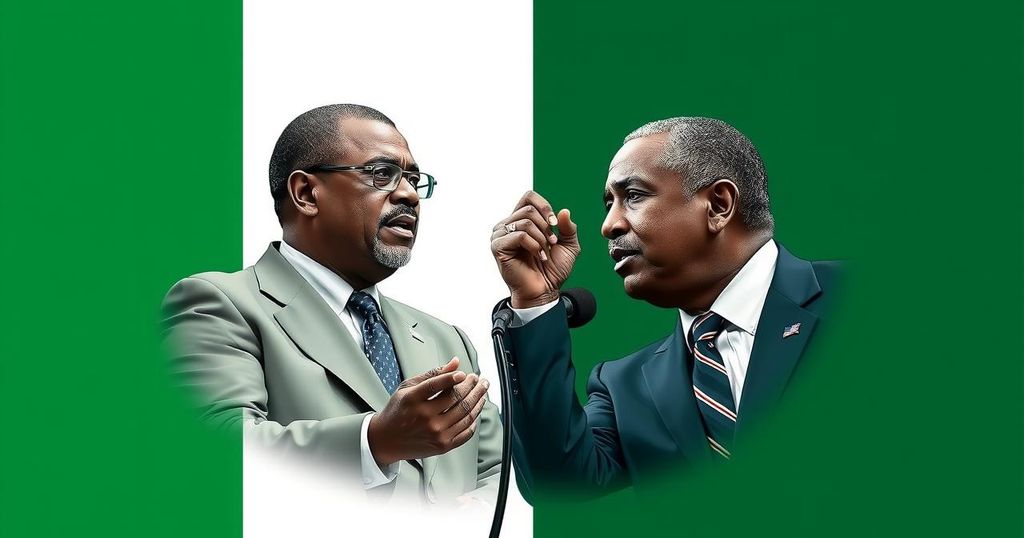Navigating Post-Election Realities: A Nigerian Perspective on U.S. Politics

The article reflects on the emotional aftermath of electoral defeats, focusing on parallels between the Nigerian and U.S. presidential elections. It emphasizes the need for unity and integrity in leadership, discussing the author’s experiences and observations of election outcomes that foster societal division. The text advocates for a respectful dialogue post-election, urging leaders to embody their calls for unity through genuine actions.
In light of the recent U.S. presidential election outcome, it is crucial for individuals, particularly those whose preferred candidates did not emerge victorious, to confront the reality of the results and adapt accordingly. The experience of watching a favored candidate lose can be particularly disheartening, as evidenced by the author’s own journey during Nigeria’s 2015 election between Muhammadu Buhari and Goodluck Jonathan. Although the author supported Jonathan, who ultimately lost, they witnessed the adverse effects of Buhari’s presidency on Nigeria’s socio-economic landscape.
The sentiment of disillusionment continued when the author supported Peter Obi in the 2023 Nigerian election against Bola Tinubu. Many Nigerians saw Obi as a beacon of change in a political milieu marred by corruption and malpractice. Despite Obi’s significant grassroots support and the financial contribution made towards his campaign, he ultimately finished third in the election results. His subsequent legal battle to contest the election outcome concluded with a court ruling that dismissed his claims, solidifying Tinubu’s presidency amidst widespread claims of irregularities during the election.
The parallels drawn between the political climates of Nigeria and the United States underscore concerns regarding leadership integrity and electoral fairness. Observers noted that while Nigeria’s Supreme Court upheld what has been deemed one of the worst elections in its history, similar sentiments arose in the U.S. following Donald Trump’s controversial election campaign and subsequent victory despite numerous legal challenges. Emmanuel Ogebe, a legal expert, asserted that the erosion of moral values in both countries poses dire consequences for future generations, as they witness that unethical conduct is often rewarded, rather than punished.
Since Tinubu’s ascendance to the presidency, Nigeria has grappled with a declining economy, record inflation, and sociopolitical divisions that have festered in the aftermath of a contentious election season. Such divisions resonate with the increasing polarization observed in the United States, particularly among Trump supporters and detractors. While both nations face similar post-election tensions, a change in approach towards post-election discourse and conduct is indispensable.
Prominent figures in both countries have espoused unity; however, the sincerity of such calls is often put into question when accompanied by disparaging remarks. It is paramount for leaders, including President Trump, to demonstrate a commitment to unity rather than division, or risk perpetuating animosity among the populace. As the author concludes, the essence of any call for unity must be supported by actions that promote mutual respect and understanding among all citizens, regardless of political affiliation.
Confronting the harsh realities of electoral outcomes may be daunting, yet adopting a more respectful and humble approach can pave the way for healing and reconciliation in both Nigeria and the United States.
This article discusses the impact of election outcomes on citizens’ sentiments, drawn from the author’s personal experiences with Nigerian elections and the recent U.S. presidential election. The author highlights the emotional challenges faced by supporters of losing candidates and reflects on the broader implications of leadership integrity and electoral fairness in both Nigeria and the United States. Furthermore, the piece establishes a connection between the political climates in both countries, addressing the need for unity amidst deep divisions.
In conclusion, the outcomes of elections in both Nigeria and the United States serve as poignant reminders of the importance of integrity in leadership and the need for constructive post-election dialogue. As citizens grapple with disappointment and disillusionment, fostering an environment of mutual respect and understanding will be paramount for political unity and progress. The actions of leaders in the wake of these elections—if genuinely aimed at promoting unity—will ultimately determine the prevailing political climate in both nations moving forward.
Original Source: baptistnews.com






